In its latest annual survey of the world’s top 6,603 think tanks, the University of Pennsylvania has ranked the Delhi-based Centre for Civil Society India’s No.1 in its Global Go-To Think Tank league table headed by the Brookings Institution (USA), Chatham House (UK), and Carnegie Endowment for International Peace (USA). K.V. Priya with Dilip Thakore
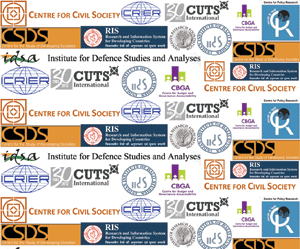 Even as the year 2013 got off to a gloomy and despondent start with the national debate on gender crimes and second class status of women in Indian society generating considerable anguish and anxiety following the vicious gangrape of a 23-year-old physiotherapy intern in a moving bus coursing through busy streets of the national capital, the outcome of a largely unnoticed global survey conducted by the University of Pennsylvania has created a buzz within the small minority of globally-connected intellectuals and the social sciences research community.
Even as the year 2013 got off to a gloomy and despondent start with the national debate on gender crimes and second class status of women in Indian society generating considerable anguish and anxiety following the vicious gangrape of a 23-year-old physiotherapy intern in a moving bus coursing through busy streets of the national capital, the outcome of a largely unnoticed global survey conducted by the University of Pennsylvania has created a buzz within the small minority of globally-connected intellectuals and the social sciences research community.
In its latest (2012) annual survey of the world’s top 6,603 think tanks conducted under its Think Tanks and Civil Societies Program (TTCSP), U Penn ranked the Delhi-based Centre for Civil Society (estb. 1997) India’s No.1 (51 worldwide) in its Global Go-To Think Tank league table headed by the Brookings Institution (USA), Chatham House (UK), Carnegie Endowment for International Peace (USA), Stockholm International Peace Research Institute, Sweden (4) and Centre for Strategic and Int. Studies, USA (5). Among the other Indian think tanks ranked in the survey are the Institute for Defence Studies and Analyses, Delhi (105), Indian Council for Research on International Economic Relations, Delhi (109), The Energy and Resources Institute, Delhi (110), Observer Research Foundation, Mumbai (115) and Development Alternatives, Delhi (141).
Inevitably, U Penn’s sixth annual survey released on January 28, has been conducted with the thoroughness for which US academia is globally renowned. Over 6,600 think tanks from 182 countries were invited to participate in the rankings and were ranked in 38 categories by 1,950 experts and peer institutions including 793 expert panel-ists, 55 current and former directors of think tanks, 150 journalists and scholars, 40 public and private donors, 150 civil society representatives and 120 academic institutions worldwide. Of the 6,603 think tanks invited for assessment and rankings, 171 were nominated for inclusion in the list of the global 150.
Unlike high profile American think tanks such as the Brookings Institution, the Carnegie Endowment and other well-funded institutes which attract highly respected authors, professors and elder statesmen as scholars and researchers and convene global conferences, the role and value of think tanks which conduct policy-oriented research and analyses and provide advice on domestic and international issues to governments and policy formulators to make informed decisions and build media and public opinion, is largely unappreciated in India.
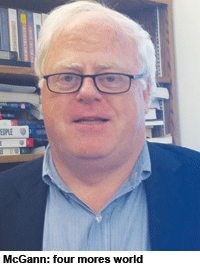 The role of think tanks in society is elaborated by James G. McGann, assistant director of the international relations program and director of TTCSP at U Penn. “The world we live in can be characterised by what has been described as the ‘four mores’: more issues, more actors, more competition, and more conflict. Over the past 10-15 years, governments and civil society groups have become reliant on think tanks for ideas and advice. Today policymakers and civil society throughout the developed and developing world face the common problem of bringing expert knowledge to bear on government decision-making. The challenge is to harness the vast reservoir of knowledge, information and associational energy that exists in public policy research organisations in every region of the world for the public good,” says McGann.
The role of think tanks in society is elaborated by James G. McGann, assistant director of the international relations program and director of TTCSP at U Penn. “The world we live in can be characterised by what has been described as the ‘four mores’: more issues, more actors, more competition, and more conflict. Over the past 10-15 years, governments and civil society groups have become reliant on think tanks for ideas and advice. Today policymakers and civil society throughout the developed and developing world face the common problem of bringing expert knowledge to bear on government decision-making. The challenge is to harness the vast reservoir of knowledge, information and associational energy that exists in public policy research organisations in every region of the world for the public good,” says McGann.
Against this backdrop of the expanding role of think tanks in shaping legislation and public policy, it’s hardly surprising that Dr. Parth J. Shah, an alumnus of Maharajah Sayajirao, Baroda and Auburn (USA) universities and former professor of economics at Michigan University who returned to India to promote the Centre for Civil Society (CCS) in 1997, is pleased that U Penn’s survey has ranked CCS the country’s premier think tank. “Think tanks are playing an increasingly important role in all societies by regularly publishing well-researched and reasoned position papers on complex issues impacting the public and society, and by offering independent advice to governments. Therefore I’m delighted that CCS’ high quality multi-sectoral, multi-disciplinary research studies suggesting policy initiatives for reforms in education, livelihoods, governance and rule of law have been acknowledged by the U Penn study. However this delight has been tempered by the awareness that although we are ranked first in India, our global ranking is 51,’’ says Shah.
| Global Top 10 think tanks
1. Brookings Institution (USA) 2. Chatham House (UK) 3. Carnegie Endowment for International Peace (USA) 4. Stockholm International Peace Research Institute (Sweden) 5. Center for Strategic and International Studies (USA) 6. Council on Foreign Relations (USA) 7. Amnesty International (UK) 8. Bruegel (Belgium) 9. Rand Corporation (USA) 10. International Institute for Strategic Studies (UK) 51. Centre for Civil Society (India) 105. Institute for Defence Studies and Analyses (India) 109. Indian Council for Research on International Economic Relations (India) 110. The Energy and Resources Institute (India) 115. Observer Research Foundation (India) 141. Development Alternatives (India) Source: Global Go-to Think Tank Index 2012 (U Penn) |
Nevertheless it’s an entirely socially beneficial development that the idea of promoting, nurturing and developing specialist think tanks has struck root in India. According to the U Penn survey, currently India hosts 292 think tanks — the third largest number after the US (1,832) and China (425). And new think tanks with specialised agendas are springing up regularly. Among them, the Delhi-based Indian Institute of Dalit Studies (estb. 2001) has contributed significantly to shaping the affirmative action policies of the Central and state governments. More recently, early this year the Indian Software Product Industry Round Table, or iSprit, a think tank promoted with the objective of providing policy prescriptions to government to expand and nurture the high potential IT and ITES (information technology and information technologies enabled services) sectors in coordination with industry representative organisations including NASS-COM (National Association of Software Services Companies), went on stream.
That new think tanks have sprung up countrywide is a welcome albeit surprising development because government, corporate and philanthropic grants and research funding tend to be grudging. Whereas the endowment/assets of the Brookings Institution aggregates a handsome $437 million (Rs.2,360 crore), and revenue in 2012 aggregated $132 million (Rs.713 crore), CCS hasn’t been able to build a corpus and raises funds from year-to-year. In 2012-13, the society which employs 30 research and advocacy professionals, raised Rs.2 crore with the Dorabji Tata Trust and Templeton and Atlas Foundations being the main donors. “Successful fundraising is a major problem, particularly since as a matter of policy we diversify our funding sources to avoid dependence on single or dual source funding to preserve our independence. Moreover apart from research we also spend money on advocacy, i.e. educating the public including MPs, on matters of public interest and legislation,’’ says Parth Shah.
Dr. Samar Verma, senior programme officer of the International Development Research Centre, Delhi — a Canadian government initiative which supports 16 think tanks in South Asia (including nine in India) — confirms that funding and government support for policy research institutes is minimal. According to him, the Union government’s allocation for policy research institutes aggregates a mere 8 percent of the national science and technology research budget, and is steadily declining. “Policy research is at the heart of realising Nehru’s vision of developing a scientific temper, and think tanks are its key drivers. Funding is abysmally low, and declining. This needs to be reversed and funding increased multi-fold,’’ he advises.
Sources within the Indian Council for Social Science Research (ICSSR), the premier government agency promoting social science research, confirm that the council’s meagre annual budget actually declined by 7 percent during the period 2005-10. Currently, Indian industry and government together spend the equivalent of a mere 0.9 percent of GDP on R&D as against the US (2.7 percent), China (1.87 percent), Japan (3.67 percent) and South Korea (3.74 percent). It should also be borne in mind that the GDP of America and China is three fold and twice larger than of India. Moreover according to Unesco’s World Social Science Report 2010, during the period 1995-2007, India’s output in terms of social science research papers was significantly lower than of China and Brazil.
Likewise India Inc’s enthusiasm for funding research and development — especially policy research — has always been lukewarm. With the exception of the Tata Group and Mukesh Ambani who promoted the Observer Research Foundation in 1990, and venture capitalist turned social entrepreneur Ashish Dhawan, few leaders of industry have shown interest in funding think tanks. In 2009 telecom czar Sunil Mittal preferred to endow the Indian School of Business and the US-based Carnegie Endowment rather than any think tank in India. Consequently, Indian think tanks are heavily reliant for project funding on western voluntary organisations and progressive foundations such as the Ford Foundation, the Canada-based IDRC, private trusts constituted by American philanthropists such as Bill Gates, and multilateral financial institutions like the World Bank, the Asian Development Bank, Rockefeller, McCarthy and Sasakawa foundations.
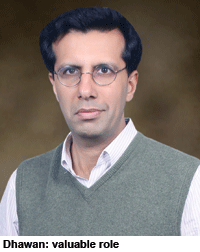 Ashish Dhawan, former CEO of ChrysCapital, India’s largest ($2.5 billion) and arguably most successful venture capital fund and promoter of the Central Square Foundation, a philanthropy fund established to finance “exceptional social entrepreneurs with powerful ideas” (with a reported initial endowment of Rs.50 crore), believes that in its own interest India Inc. should be more supportive of India’s under-funded think tanks. “For the country to progress, we need fresh ideas and a culture of making policy decisions based on evidence. Think tanks play a valuable role in conducting independent research studies which can — and should — be used to enrich public debates and policy formulation. Industry leaders and philanthropists would allocate philanthropic resources more optimally by donating 10-20 percent to think tanks of their choice and the rest for direct projects,” advises Dhawan.
Ashish Dhawan, former CEO of ChrysCapital, India’s largest ($2.5 billion) and arguably most successful venture capital fund and promoter of the Central Square Foundation, a philanthropy fund established to finance “exceptional social entrepreneurs with powerful ideas” (with a reported initial endowment of Rs.50 crore), believes that in its own interest India Inc. should be more supportive of India’s under-funded think tanks. “For the country to progress, we need fresh ideas and a culture of making policy decisions based on evidence. Think tanks play a valuable role in conducting independent research studies which can — and should — be used to enrich public debates and policy formulation. Industry leaders and philanthropists would allocate philanthropic resources more optimally by donating 10-20 percent to think tanks of their choice and the rest for direct projects,” advises Dhawan.
Even though India’s best think tanks are minuscule by foreign — especially US — standards, the fact that they have survived and multiplied and attract high quality faculty and research scholars, indicates that there’s growing appreciation of the valuable role they play in shaping public opinion and aiding policy formulation processes. That the ground has been prepared by India’s pioneer think tanks is indicated by a January 29 announcement that the US-based Brookings Institution which has topped U Penn’s Global Go-To Think Tank league table for the past four years, is set to establish a policy research centre in Delhi this year headed by Cambridge-educated Vikram Mehta, hitherto chairman of the Shell Group of petroleum companies. “Brookings India will utilise Brookings’ time-tested methods as the world’s leading think tank while providing an Indian perspective in the policy debate,” says Mehta.
In the pages following, we offer snapshot profiles of India’s Top 10 think tanks engaged in valuable research on issues of national importance which need support and involvement with industry and the public.
Centre for Civil Society
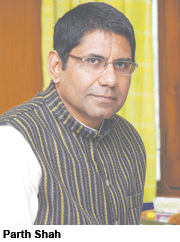 Promoted in 1997 by Dr. Parth J. Shah, an alumnus of MS University, Baroda and Auburn University, USA, and former professor of economics at Michigan University, the Centre for Civil Society, Delhi describes itself as “an independent, non-profit, research and educational organisation devoted to improving the quality of life for all citizens of India by reviving and reinvigorating civil society’’.
Promoted in 1997 by Dr. Parth J. Shah, an alumnus of MS University, Baroda and Auburn University, USA, and former professor of economics at Michigan University, the Centre for Civil Society, Delhi describes itself as “an independent, non-profit, research and educational organisation devoted to improving the quality of life for all citizens of India by reviving and reinvigorating civil society’’.
“Civil society is an evolving network of associations and institutions of family and community, of production and trade, and of piety and compassion. Individuals enter into these relationships as much by consent, as by obligation, but never under coercion. Civil society is premised on individual freedom and responsibility, and on limited and accountable government. It protects the individual from the intrusive state and connects the individual to the larger social and economic order,’’ says Shah, explaining the name chosen for this social sciences research and advocacy organisation, which has been ranked India’s top think tank for the fourth year in a row in the University of Pennsylvania’s Global Go-To Think Tank Rankings. In U Penn’s latest (2012) league table of 171 think tanks published on January 28, CCS is ranked 51 and is the only Indian one in the list of the top 100.
Focus areas. A quintessentially liberal ideology-driven organisation, CCS’ research, advocacy and outreach programmes driven by the “dream of a free society”, focus on education for all, law, liberty and livelihood, good governance and communities, markets and environment. The CCS board includes 17 liberal ideologues and economists including Jagdish Bhagwati, Lord Meghnad Desai, Gurcharan Das, Swaminathan Aiyar and social entrepreneur Ashish Dhawan.
“The distinguishing feature of CCS is that we are not a mere research and publishing institute but an advocacy organisation, which takes positions on public policy issues and educates the public and policy formulators, rather than merely holding closed door meetings with ministers and officials,’’ says Shah.
Centre for Policy Research
Domestically India’s most well-known think tank with a formidable faculty and high media profile, the Centre for Policy Research (CPR), Delhi is conspicuously absent from the University of Pennsylvania’s Global Go-To Think Tank league table compiled under its Think Tanks and Civil Societies Program (TTCSP) 2012. Established in 1973, CPR is an independent and non-partisan research institute promoted to “provide thought leadership and creative solutions to address pressing intellectual and policy issues”. It is one of the 27 national social science research institutes recognised by the Indian Council of Social Science Research (ICSSR), from which it receives a modest annual grant (Rs.53 lakh in 2011-12). According to Dr. James McGann, director of U Penn’s TTCSP, although CPR was ranked in their previous league tables, the centre “didn’t participate in the 2012 Global Go-To Think Tank peer nomination and ranking process despite our attempts to reach them”.
Focus areas. Nevertheless within India’s academic and intellectual fraternities, CPR, which has a corpus fund of Rs.7.20 crore and incurred a total expenditure of Rs.11.91 crore (receipts Rs.15 crore) in fiscal 2011-12 is highly respected for its excellent faculty and researchers, and great influence within government, academia and the media. The centre’s main focus areas are economic policy analysis, environmental law and governance, law, regulation and the state, urbanisation and international relations and security.
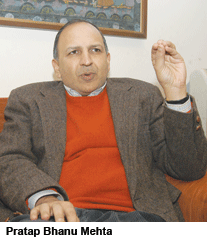 CPR’s high-profile three dozen-strong faculty includes economist Bibek Debroy, defence strategists Brahma Chellaney and Bharat Karnad, environmentalist Navroz K. Dubash and former foreign secretary G. Parthasarathy, among other stellar intellectuals. The president and chief executive of CPR is Dr. Pratap Bhanu Mehta, an alumnus of Oxford and Princeton universities and former visiting professor of government at Harvard University, and also former professor of philosophy, law and governance at Jawaharlal Nehru University. The author of several scholarly tomes including Liberalism, Nation and Empire: The Case of J.S. Mill; The Oxford Companion to Politics in India; Public Institutions in India: Performance and Design and The Burden of Democracy, Mehta is also a prolific columnist and awardee of the Infosys Prize 2011 for social sciences — political science and international relations.
CPR’s high-profile three dozen-strong faculty includes economist Bibek Debroy, defence strategists Brahma Chellaney and Bharat Karnad, environmentalist Navroz K. Dubash and former foreign secretary G. Parthasarathy, among other stellar intellectuals. The president and chief executive of CPR is Dr. Pratap Bhanu Mehta, an alumnus of Oxford and Princeton universities and former visiting professor of government at Harvard University, and also former professor of philosophy, law and governance at Jawaharlal Nehru University. The author of several scholarly tomes including Liberalism, Nation and Empire: The Case of J.S. Mill; The Oxford Companion to Politics in India; Public Institutions in India: Performance and Design and The Burden of Democracy, Mehta is also a prolific columnist and awardee of the Infosys Prize 2011 for social sciences — political science and international relations.
“It’s awkward to judge one’s own institution. But I will state that we have an excellent faculty which is doing exciting work in the areas of international relations, environment, urbanisation and law. But we are aware that CPR needs to be scaled up and establish a greater international presence,’’ says Mehta.
IDSA, Delhi
Established in 1965 after the second Indo-Pak war of that year, the Delhi-based Institute for Defence Studies and Analyses (IDSA) describes itself as “a non-partisan, autonomous body dedicated to objective research and policy relevant studies on all aspects of defence and security. Its mission is to promote national and international security through the generation and dissemination of know-ledge on defence and security-related issues”. The faculty and members of the institute pride themselves for having “played a crucial role in shaping India’s foreign and security policies, including with respect to nuclear weapons, military expenditure, and conventional and non-conventional threats to India”.
Focus areas. Wholly funded by the Central government with an annual budget of Rs.10-11 crore, IDSA has a well-qualified multi-disciplinary research faculty drawn from academia, the defence and civil services. Although the institute is fully funded by the Union government, and its executive council chaired by the Union defence minister ex-officio, it also shapes public opinion on defence and security matters of national importance through IDSA’s journals, monographs, briefs, and books through which it provides analyses and policy recommendations. In addition, the institute’s faculty and experts are encouraged to write op-ed columns and essays in the media, give interviews and participate in public and media debates.
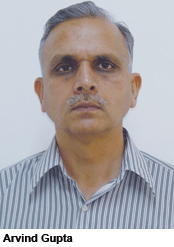 Credit for the nurturance and development of IDSA into a globally respected defence and security strategies think tank is unanimously given to the late K. Subrahmanyam (1929-2011) who served as the high-profile second director of the institute for nine years from 1966-75. Although he moved on to other senior assignments in the Central government after the end of his term in IDSA, Subrahmanyam remained an influential member of the executive council and played a major role in shaping India’s nuclear deterrent policy, including its ‘no first use’ declaration. Moreover, he was a major advocate of the Indo-US civilian nuclear accord of 2007.
Credit for the nurturance and development of IDSA into a globally respected defence and security strategies think tank is unanimously given to the late K. Subrahmanyam (1929-2011) who served as the high-profile second director of the institute for nine years from 1966-75. Although he moved on to other senior assignments in the Central government after the end of his term in IDSA, Subrahmanyam remained an influential member of the executive council and played a major role in shaping India’s nuclear deterrent policy, including its ‘no first use’ declaration. Moreover, he was a major advocate of the Indo-US civilian nuclear accord of 2007.
“Although we are government-funded, IDSA is an autonomous institute which not only studies and researches government proposed subjects, but also independently commissions studies and disseminates our views on matters of national security and defence for public information and debate. We also believe it is our role to publish papers by scholars who are constructively critical of government policy,” says Brig. (Retd) Rumel Dahiya, deputy director-general of IDSA.
The incumbent director of IDSA is Arvind Gupta, IFS, a ministry of external affairs bureaucrat on deputation to IDSA, who also held the Lal Bahadur Shastri Chair on National Security at IDSA (2008-11) before being appointed director of the institute in January last year.
ICRIER, Delhi
Indian Council for Research on International Economic Relations (ICRIER, estb. 1981) is a policy-oriented, not-for-profit, economic policy think tank. ICRIER’s main objective is to enhance the knowledge content of policy-making by undertaking analytical research targeted at informing India’s policy makers, and also at improving the country’s interface with the global economy. Promoted by the late distinguished civil servant K.B. Lall (1917-2005), by propagating the virtues of free trade internationally, this Delhi-based think tank played a major role in preparing the ground for economic liberalisation and deregulation of the Indian economy in 1991.
Focus areas. With over 80 personnel including 60 research professionals and an annual budget of Rs.12 crore, the institute’s focus areas are macro-economic management in an open economy; trade openness, financial sector liberalisation and regulation; WTO-related issues; regional economic cooperation in South Asia; and climate change. The institute derives its income by way of sponsored research assignments from the Union ministries of finance, commerce, urban development, external affairs, industry representative organisations and multilateral aid agencies.
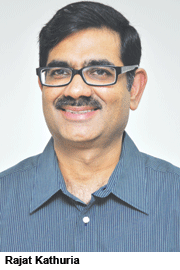 The chairperson of ICRIER is well-known economist Dr. Isher Judge Ahluwalia and the board of governors includes Dr. Vijay Kelkar, Chanda Kochhar, Uday S. Kotak, and Anand Mahindra, with Dr. Shankar Acharya and Nitin Desai serving as honorary professors.
The chairperson of ICRIER is well-known economist Dr. Isher Judge Ahluwalia and the board of governors includes Dr. Vijay Kelkar, Chanda Kochhar, Uday S. Kotak, and Anand Mahindra, with Dr. Shankar Acharya and Nitin Desai serving as honorary professors.
“All of the research we do is in the public domain and can be utilised by all, including Union and state governments for policy formulation. However, some of our research is sponsored by the government and directly feeds into policy-making. Generally, we provide analyses on crucial issues relating to the impact of global economic trends on India, the impact of fiscal consolidation, and impact of economic changes in the US and Europe on India. These research studies ultimately shape policies of the Union government,’’ says Dr. Rajat Kathuria, former professor of economics at the University of Maryland (USA) and the International Management Institute, Delhi who was appointed director of ICRIER in September 2012.
CSDS, Delhi
A pioneer think tank of India promoted in 1964 by Prof. Rajni Kothari, one of India’s top political scientists in his time, the Delhi-based Centre for the Study of Developing Societies (CSDS) is a highly respected institute for study of social sciences and the humanities. It prides itself on providing “a unique institutional space which seeks to nurture intellectual interests outside the entrenched boundaries of academic disciplines… to support and nurture interdisciplinary modes of enquiry”. Moreover, as implicit in its nomenclature, ab initio the centre, which is fully funded by ICSSR (Indian Council for Social Sciences Research), has encouraged exchanges with scholars in third world countries and South Asia in particular.
Focus areas. Over the past 48 years since it was founded, CSDS has developed research and study expertise across a broad spectrum of activities. Among them: empirical political studies; social and political theory; media and modernity; anthropology, cultural history and psychology of modern forms of power and violence; alternative futures, critical debates on modernity and secularism; urban history; old and new media history; globalisation and contemporary lives; law and legal practices; gender studies; and the Indian language programme in translation.
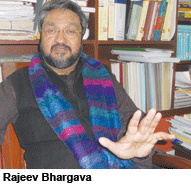 Current on-going study and research programmes at CSDS include the Lokniti Programme for Comparative Democracy; the Sarai Programme: Media, City, Public Domain; the Institute for Chinese Studies; the Programme in Social and Political Theory and the Indian Language Programme.
Current on-going study and research programmes at CSDS include the Lokniti Programme for Comparative Democracy; the Sarai Programme: Media, City, Public Domain; the Institute for Chinese Studies; the Programme in Social and Political Theory and the Indian Language Programme.
To study and research this broad spectrum of programmes, the centre has attracted a faculty of highly articulate and respected intellectuals including sociologist/psychologist Ashis Nandy; feminist author and journalist Madhu Kishwar, and psephologist and social scientist Yogendra Yadav, among others. “We contest the popular belief that the function of think tanks is to merely produce information, studies and reports for the government and public to make the best of them. We classify ourselves as a research institution with public relevance, and as such we regard it our duty to shape and influence public debate on matters of national interest, and to enrich the quality of public discourse by bringing in more voices, especially voices of the traditionally excluded,” says Dr. Rajeev Bhargava, an economics alumnus of Delhi University with a doctorate from Oxford, former head of the faculty of political science at Delhi University and currently director of CSDS. Also author of eight books on the social and political sciences, Bhargava’s latest titles are Political Theory: An Introduction and Why do we Need Political Theory? (2010) and The Promise of India’s Secular Democracy (2010).
Observer Research Foundation
The timing of the establishment of the Observer Research Foundation (September 5, 1990), founded by the Ambani family, promoters of Reliance Industries Ltd, India’s largest private sector company (revenue: Rs.339,792 crore in 2011-12), to aid India’s transition from “a protected economy to a new engagement with the international economic order” after the collapse of communism and the Soviet Union, suggests that this resources-rich think-tank played a major and hitherto unknown role in India’s historic economic liberalisation and deregulation policy about-turn of July 1991. Quite obviously the policy papers and detailed documents which underpinned the watershed liberalisation initiative had to be researched and prepared and according to usually reliable sources, ORF made a valuable contribution in enabling this momentous about-turn which transformed the Indian economy into one of the fastest growing world-wide during the next two decades.
Since then, ORF which was promoted by veteran journalist R.K. Mishra (1932-2009) after he failed to turnaround the Sunday Observer and the Business and Political Observer — an economic daily for Reliance Industries — has won encomiums from academics and industry for successfully undertaking challenging social research and economic development projects. The foundation’s number of employees, including 87-strong faculty has risen to 102 (72 in Delhi and 30 spread over its three centres in Mumbai, Chennai and Kolkata) with its publications including books, occasional and seminar papers aggregating 88 over the past two years. ORF’s annual expenditure for the foundation’s activities aggregated Rs.12 crore last year and is expected to cross Rs.16 crore this fiscal.
Focus areas. ORF’s stated objectives are to aid the formulation of government policies and evolve alternatives; strengthen India’s democratic institutions to enable coherent, reasoned and consistent policy formulation; provide reasoned inputs representing a broad section of opinion to improve governance, accelerate economic development and deliver a better quality of life for all Indian citizens, and provide direction to India’s long-term foreign policy objectives.
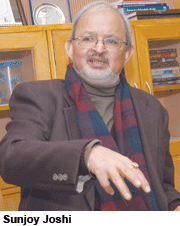 To attain these objectives the foundation has recruited an array of impressive faculty and researchers including defence strategist Dr. C. Raja Mohan; economic and financial analyst Mohan Guruswamy; international relations and intelligence expert Vikram Sood; defence studies strategist Gen. (Retd) Nirbhay Sharma; aerospace expert Dr. Vivek Lall and physicist Dr. Rajan Gupta, among others. “As a serious and purposive think tank we believe it is our duty to encourage articulation of numerous points of view and open up the discursive space. In the ORF faculty we include scholars from across the ideological spectrum and encourage them to discuss and debate national development issues and government policies. That’s how the foundation played an important role in building a national consensus over the historic economic liberalisation and deregulation policy initiative of 1991. As a foundation promoted by an experienced and successful corporation, we believe we can infuse valuable pragmatism into policy formulation debates,” says Sunjoy Joshi, director of ORF. An alumnus of Allahabad and East Anglia (UK) universities who served the Union government as an IAS officer in various capacities for over 25 years, Joshi quit the civil service after he was appointed director of the foundation in 2007.
To attain these objectives the foundation has recruited an array of impressive faculty and researchers including defence strategist Dr. C. Raja Mohan; economic and financial analyst Mohan Guruswamy; international relations and intelligence expert Vikram Sood; defence studies strategist Gen. (Retd) Nirbhay Sharma; aerospace expert Dr. Vivek Lall and physicist Dr. Rajan Gupta, among others. “As a serious and purposive think tank we believe it is our duty to encourage articulation of numerous points of view and open up the discursive space. In the ORF faculty we include scholars from across the ideological spectrum and encourage them to discuss and debate national development issues and government policies. That’s how the foundation played an important role in building a national consensus over the historic economic liberalisation and deregulation policy initiative of 1991. As a foundation promoted by an experienced and successful corporation, we believe we can infuse valuable pragmatism into policy formulation debates,” says Sunjoy Joshi, director of ORF. An alumnus of Allahabad and East Anglia (UK) universities who served the Union government as an IAS officer in various capacities for over 25 years, Joshi quit the civil service after he was appointed director of the foundation in 2007.
CUTS-International
The Jaipur-based Consumer Unity & Trust Society (aka CUTS-International) traces its origins to a monthly wall newspaper Gram Gadar (‘village revolution) which began circulation in 1983, to apprise rural citizens in the north-western state of Rajasthan (pop. 68 million) about various schemes of the Central and state governments promoted for their welfare and upliftment. Currently Gram Gadar is being displayed in 27,000 villages countrywide. However, in the mid-1980s following the promulgation of the United Nations Guidelines for Consumer Protection, 1985 and enactment of the Consumer Protection Act, 1986 in India, the trust became a pioneer champion of consumer rights, active in resolving individual consumer grievances by way of filing class action suits and PILs (public interest litigation) in the courts. In 1991, CUTS became a member of the International Organisations of Consumer Unions (later renamed Consumers International) to make common cause with the global movement for consumer rights.
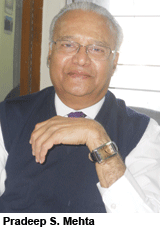 Focus areas. Driven by the vision statement, “consumer sovereignty in the framework of social justice and equality within and across borders”, the institutional focus of CUTS-International is consumer protection; international trade and development; competition, investment and economic regulation; human development and consumer safety. The society which has a headcount of 140 employees and an assets base of Rs.3.42 crore and spent Rs.11.75 crore on its activities in 2011-12, is actively involved with the framing of a national competition policy, and recently submitted a policy draft and strategy to the National Competition Policy (NCP) panel headed by Dhanendra Kumar which is finalising the policy document.
Focus areas. Driven by the vision statement, “consumer sovereignty in the framework of social justice and equality within and across borders”, the institutional focus of CUTS-International is consumer protection; international trade and development; competition, investment and economic regulation; human development and consumer safety. The society which has a headcount of 140 employees and an assets base of Rs.3.42 crore and spent Rs.11.75 crore on its activities in 2011-12, is actively involved with the framing of a national competition policy, and recently submitted a policy draft and strategy to the National Competition Policy (NCP) panel headed by Dhanendra Kumar which is finalising the policy document.
“The NCP will trigger a second wave of reforms once it becomes law. The good news is that there is an all-party consensus in favour of this policy,’’ says Pradeep S. Mehta, a relentless consumer rights champion and founder secretary-general of CUTS-International, which he has nurtured into a formidable policy development and advocacy institution for consumer rights.
Indian Institute of Dalit Studies
The social immobility and still pathetic condition of the vast majority of the country’s scheduled castes and scheduled tribes (Dalits), who constitute 25 percent of the population, prompted human rights activist Martin Macwan, the Nadiad (Gujarat)-born founder-director of the Ahmedabad-based Navsarjan Trust and Dalit Shakti Kendra, and Dr. Sukhadeo Thorat, professor of economics at Jawaharlal Nehru University, Delhi and former chairman of the University Grants Commission, to promote the Delhi-based Indian Institute of Dalit Studies (IIDS) in 2003.
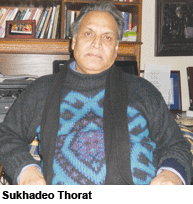 Focus areas. The primary focus of IIDS is research and generation of information on issues of social exclusion and caste, gender and religious discrimination. More specifically, the institute which has a faculty of 14 research scholars and a stellar visiting faculty from reputed academic institutions and universities in the US, UK, Ireland, Bangladesh and Nepal, is focused upon undertaking and commissioning research on theoretical concepts of social exclusion and discrimination in social, cultural, political and economic spheres; empirical research on measuring the forms, magnitude and nature of discrimination in social, cultural, political, economic and other spheres; and enabling the development of policies for social inclusion and empowerment of socially excluded groups in various areas. To this end, the institute has published an impressive number of books and working papers and convenes seminars and workshops across the country.
Focus areas. The primary focus of IIDS is research and generation of information on issues of social exclusion and caste, gender and religious discrimination. More specifically, the institute which has a faculty of 14 research scholars and a stellar visiting faculty from reputed academic institutions and universities in the US, UK, Ireland, Bangladesh and Nepal, is focused upon undertaking and commissioning research on theoretical concepts of social exclusion and discrimination in social, cultural, political and economic spheres; empirical research on measuring the forms, magnitude and nature of discrimination in social, cultural, political, economic and other spheres; and enabling the development of policies for social inclusion and empowerment of socially excluded groups in various areas. To this end, the institute has published an impressive number of books and working papers and convenes seminars and workshops across the country.
“Over the past ten years since IIDS was founded, we have researched discrimination in the employment market, access to capital markets, and non-market institutions and schemes such as the Mahatma Gandhi National Rural Employment Guarantee programme, primary health centres and the national mid-day meals programme for primary children. All our research studies include policy prescriptions and are policy advocacy documents and studies,” says Dr. Thorat, currently chairman of the Indian Council of Social Sciences Research, author of over a dozen books, and an expert on caste politics, social discrimination and exclusion.
RIS, Delhi
Established in 1983 following the summit of the Non-Aligned Movement of 137 nations which was convened in New Delhi, the Research and Information System for Developing Countries (RIS) is a New Delhi-based think tank promoted by the Union ministry of external affairs.
Focus areas. Currently the prime activity of RIS is to promote South-South Cooperation and assist developing countries in multilateral negotiations in the WTO (World Trade Organisation) and other international forums. Moreover, the think tank provides the external affairs ministry with research and policy formulation support for Track II negotiations with India’s neighbour nations, especially Pakistan. However over the years its focus has shifted to providing analytical support to the Union government in negotiations for concluding comprehensive economic cooperation agreements with partner countries.
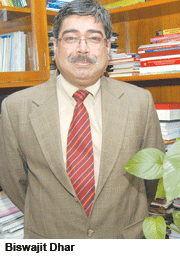 Over the past three decades since it was established by Indian diplomat G. Parthasarathy (1912-95) and economist Dr. Sukhamay Chakravarty (1934-90) with the support of prime minister Indira Gandhi, RIS has been actively engaged in international trade diplomacy and negotiations.
Over the past three decades since it was established by Indian diplomat G. Parthasarathy (1912-95) and economist Dr. Sukhamay Chakravarty (1934-90) with the support of prime minister Indira Gandhi, RIS has been actively engaged in international trade diplomacy and negotiations.
“When the institute was first established, economic diplomacy was a nascent issue. But through the 1980s and particularly after the fall of the Berlin Wall in 1989 and end of the Cold War, RIS has become actively engaged with trade and economic diplomacy and negotiations issues. Therefore, although we are funded by the ministry of external affairs, we have a greater engagement with the Union commerce ministry,” says Dr. Biswajit Dhar, director-general of the organisation.
The former head of the Centre for WTO Studies at the Indian Institute of Foreign Trade, Dhar has been involved with India’s economic diplomacy and trade negotiations for almost two decades and is highly respected in India and abroad for his knowledge of international trade and development, international finance, intellectual property rights, agriculture, technical standards and food safety regulations apart from environment issues.
Moreover RIS’ heavyweight governing council chaired by former foreign secretary Shyam Saran comprises the secretaries (ex officio) of the ministries of external affairs, commerce, finance and department of science and technology, as also Prof. B.B. Bhattacharya, former vice chancellor of Jawaharlal Nehru University, Delhi.
CBGA, Delhi
Originally promoted as a wing of the Pune-based National Centre for Advocacy Studies in 2002, three years later the Centre for Budget and Governance Accountability was spun off and registered as an independent Delhi-based not-for-profit think tank to promote transparency, participatory and accountable governance, and people-centred perspectives in policies shaping government budgets.
Focus areas. The specific objectives of CBGA are to assess the priorities underlying government budgets and their implications for underprivileged sections of the population; demystifying the discourse on budgets and governance and facilitating public understanding of these issues; encouraging people’s participation in the discourse and processes relating to budgets and governance; enhancing the capacity of social action groups for using budget data in efforts pertaining to governance accountability; advocating pro-poor and pro-marginalised perspectives in budgetary policies, and strengthening the advocacy efforts of civil society for transparent, accountable and pro-people governance.
In particular this low-profile think tank provides useful and valuable analyses of the annual Union Budget which is a bewildering statement of government revenue and expenditure, as well as a policy document and statement of intent. For instance, “a reasonably comprehensive” analysis of the Union Budget is quickly published by the centre. The draft version of Response to Union Budget is brought out within 24 hours of presentation of the Union Budget in Parliament.
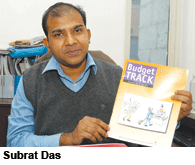 CBGA is governed by a board of directors headed by Dr. Shantha Sinha, chairperson, National Commission for Protection of Child Rights (NCPCR) and 2003 Magsaysay award winner. Its members are drawn from civil society and academia and include Dr. Jayati Ghosh, professor, Centre for Economic Studies and Planning, JNU; Fr. Manu Alphonse, founder, Social Watch Tamil Nadu; Amitabh Behar, executive director, National Foundation for India, among others.
CBGA is governed by a board of directors headed by Dr. Shantha Sinha, chairperson, National Commission for Protection of Child Rights (NCPCR) and 2003 Magsaysay award winner. Its members are drawn from civil society and academia and include Dr. Jayati Ghosh, professor, Centre for Economic Studies and Planning, JNU; Fr. Manu Alphonse, founder, Social Watch Tamil Nadu; Amitabh Behar, executive director, National Foundation for India, among others.
The centre is served by a core faculty of 21 research scholars and writers and its budget (Rs.3 crore in 2011-12) is funded by the Ford Foundation, the Canadian development agency IDRC, Christian Aid, Oxfam and Shakti Foundation, the Indian affiliate of the Climate Foundation, The Hague. “Our prime objective is to demystify government finances and assess and analyse the budgets of the Union and state governments from the perspective of their impact upon the marginalised, oppressed and excluded groups within Indian society. Through our numerous in-house publications and interactions with the media, we have been fairly successful in demystifying government finances and promoting the cause of neglected sections of Indian society,” says Subrat Das, an economics alum of Jawaharlal Nehru University and research scholar at CBGA since 2002, who was appointed executive director of the centre in 2010.
Also read: 22 Extraordinary Education Innovators























